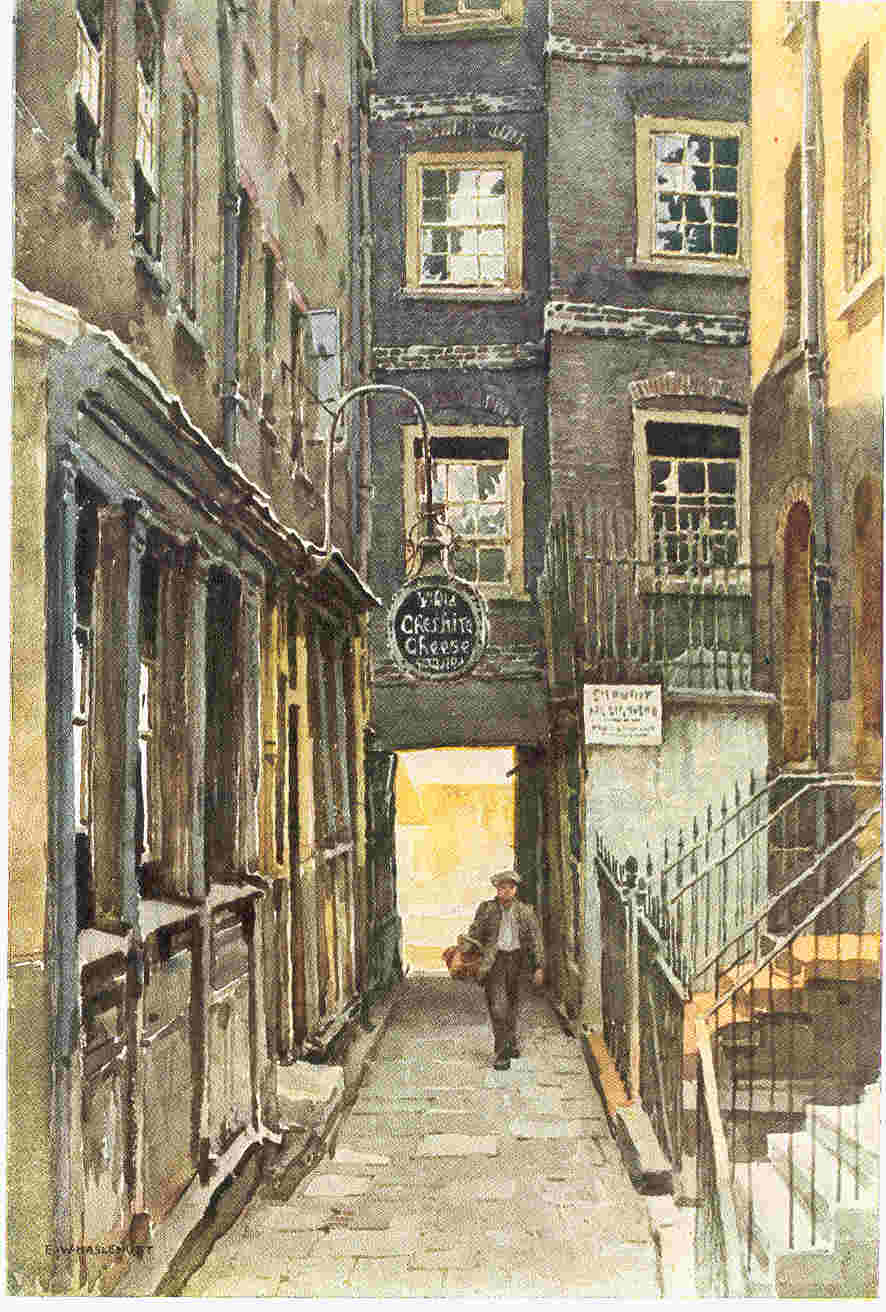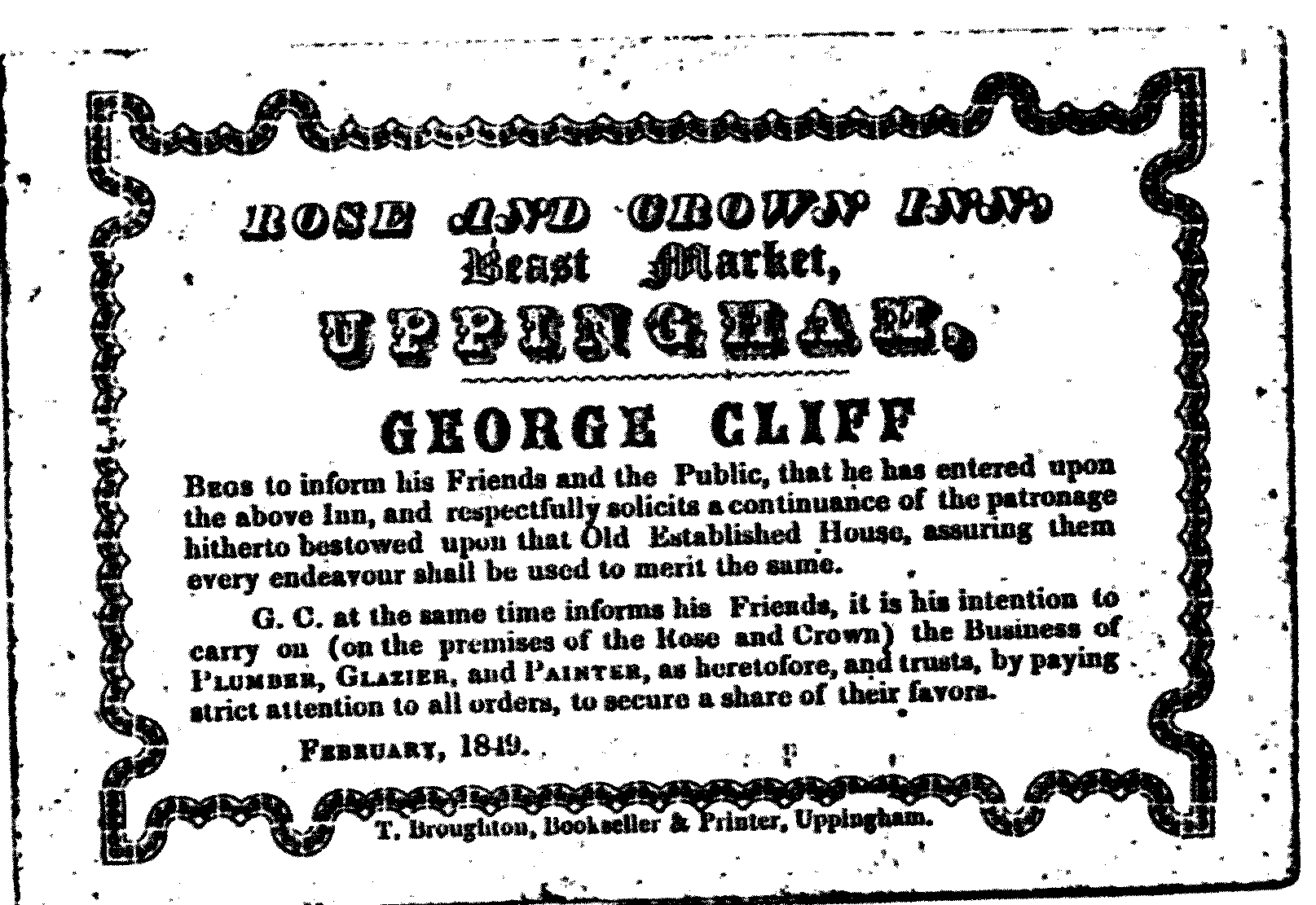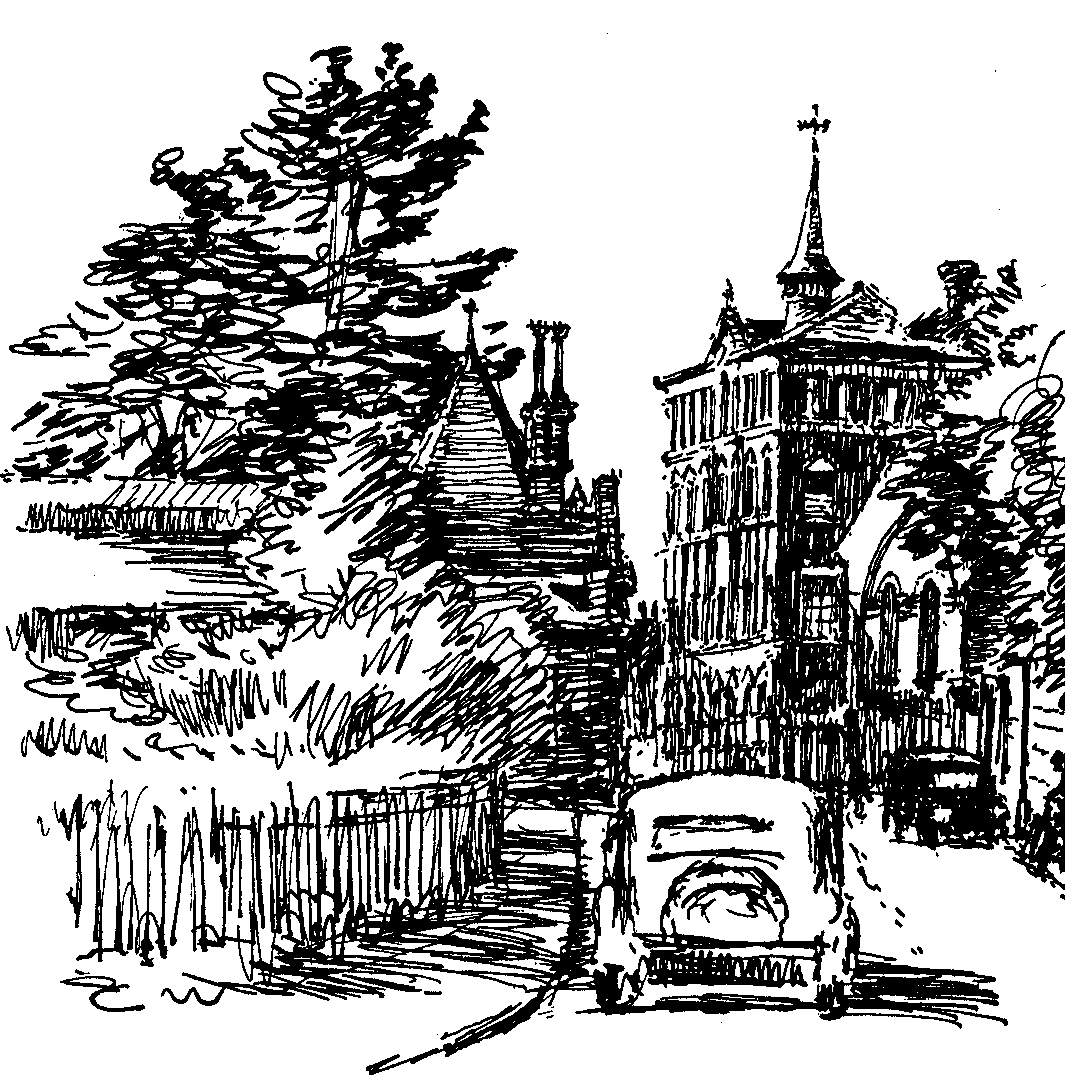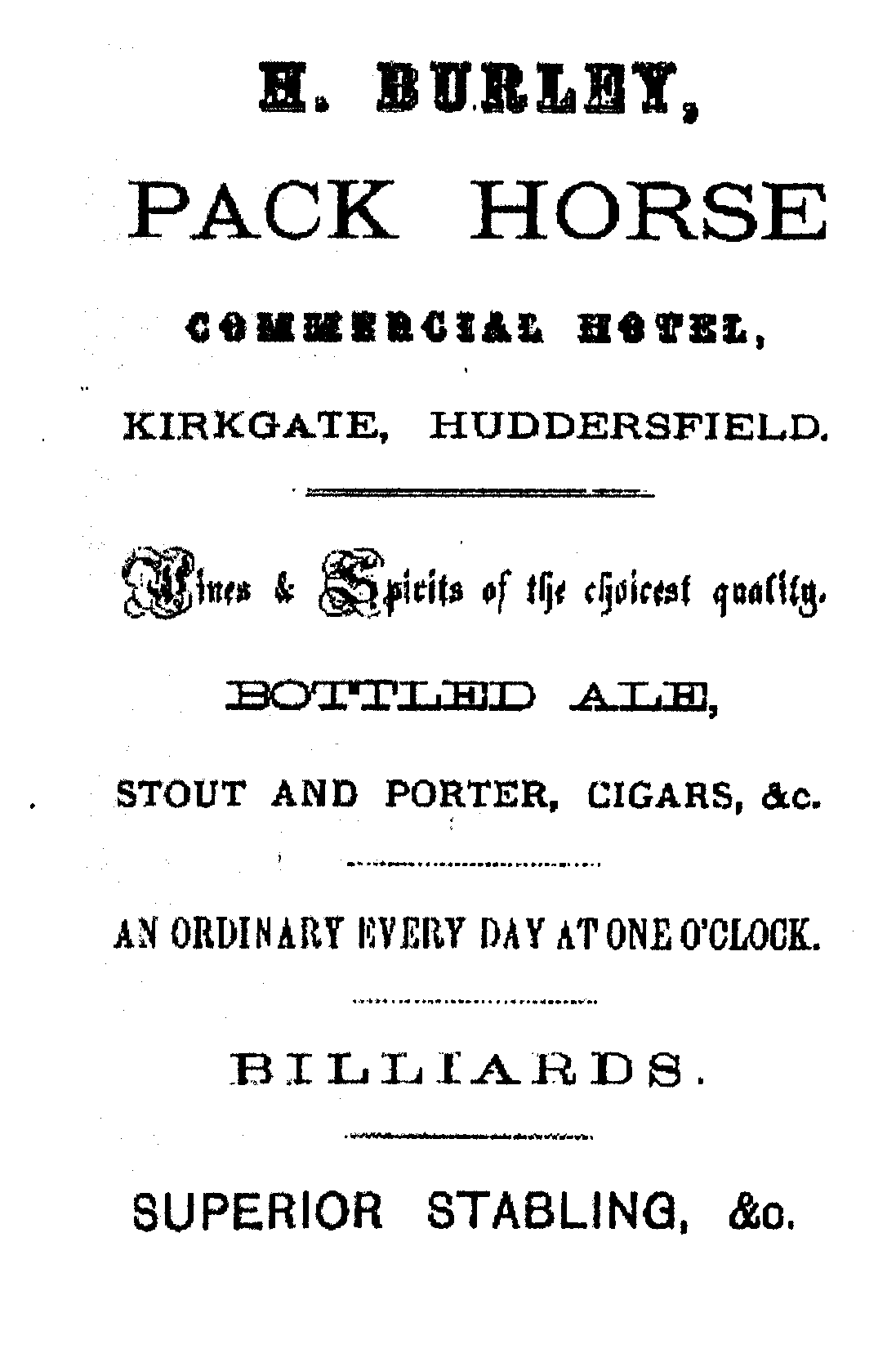 Introduction
IntroductionTracing ancestors
who worked in pubs
 Introduction
IntroductionThe public house has been an important social institution since medieval times. As the authorities have always looked on pubs with some degree of suspicion, regarding them as potential centres for dissension, drunkenness, and disorder, there are documents going back until Tudor times which list publicans. In addition there are other records which can shed light on publicans, the people they employed, and their lives.
The background
The public house as we know it today is really an invention of the 18th century, before then there were alehouses that sold beer brewed on the premises often by women, known as alewives or brewsters. More salubrious were inns, much larger establishments, which might offer food, stabling for horses, and a variety of dining and meeting rooms.
The 18th and 19th centuries saw a massive rebuilding of pubs in reaction to changing tastes and the opening of new establishments to meet new demand in industrial and suburban areas. Meanwhile more and more pubs were being bought by breweries with the object of selling the company's products. At the same time the authorities sought to close pubs as a way of reducing drunkenness, which was endemic among sections of the working classes. In addition increasing restrictions were placed on pubs, particularly with regard to opening and closing hours and the games which might be played there.
Since the Second World War a further revolution has taken place as pubs have had to compete with an increasing range of leisure pursuits. Many started selling food, while others became theme pubs in the hope of attracting young people. Their problems were compounded by immense changes in the brewing industry itself, which first saw rationalisation into a few large companies and then the decision of many breweries to stop brewing altogether.
The people
 Over the centuries hundreds of thousands of people
have run pubs. Indeed it stills remains an ambition for many a drinker, although
few realise how hard the work is. There is no
clear rule about who became publicans, alewives or innkeepers, but the following
suggestions may help you in your search.
Over the centuries hundreds of thousands of people
have run pubs. Indeed it stills remains an ambition for many a drinker, although
few realise how hard the work is. There is no
clear rule about who became publicans, alewives or innkeepers, but the following
suggestions may help you in your search.
.
A number of publicans were former sportsmen or servants (such as butlers and footmen) who often saw a pub as a way of providing for their retirement.
Many children followed their parents into running pubs. Girls started as barmaids or working in the kitchen, while boys became potboys or ostlers.
It was extremely common for publicans, particularly in smaller establishments, to work only part-time, combining run a bar with other work. During the day running the pub was left in the hands of his wife and other members of the family.
A number of women also ran pubs, often taking over on the death of their husbands or fathers.
The work
A number of different people were involved with pubs. Your ancestor may have undertaken one or more of these tasks.
. The publican, sometimes known as the landlord, licensee, licensed victualler, 'the gaffer', 'gov'nor' or 'mine host'. It is he (sometimes she) who holds the license to run the pub and it is his job to ensure the financial success of the premises. Many licensees are tenants of a brewery, that is they run the pub on an agreement with the brewery which owns it, and pay the brewery an agreed amount every year in rent. Over the past thirty years or so salaried managers, put in by the company, have begun to run an increasing number of pubs.
. Barmaids - female bar staff were often the wives and daughters of publicans, although by the end of the nineteenth century barmaids were being hired in the larger and more popular establishments. Victorian sensibilities ensured that barmaids only worked in the more expensive saloon or lounge bars, where a better class of customer was served. Pay was low and hours long, although it was the custom for accommodation and meals to be included. I have also included a description of their work.
. Barmen - tended to be young. They were better paid than barmaids, although hours were as long. Most only remained as barmen for a few years, before seeking other work. There is also a description of their work here.
. Cellarmen - are employed to look after the barrels of beer. They tend to be employed in the larger or busier establishments. Elsewhere the publican or barstaff usually managed the cellars.
. Ostlers - were men and boys who looked after the horses in coaching inns. This was important work as dozens of coaches might pass through an inn everyday.
. Potmen or potboys - potmen were originally employed to keep pewter drinking mugs clean and shiny. As glassware replaced pewter during the nineteenth century, these people were increasingly used to collect glass from tables in the bar and to act as a general servant to the pub. They were less well paid than the barstaff.
The records
Licenses
From 1552 onwards, anyone who wanted to sell ale had to apply for a licence at the Quarter Sessions or the Petty Sessions. In addition alehouse keepers had to declare that they would not keep a 'disorderly house' and prohibit games of bowls, dice, football and tennis. These declarations were called recognizances or bonds. Although the requirements have changed over the years, landlords still have to get a licence, renewed yearly, and which can be revoked if the magistrates, meeting in the annual brewster session, feel that the individual has been running a disorderly pub.
In 1617 the requirement for licences was extended to inns. In addition between 1570 and 1792 licences could be obtained directly from the Crown (from 1757 the Stamp Office) rather than from local magistrates, although few records now survive of these licences.
The system was overhauled in 1828 with a new Alehouses Act that provided a framework for granting licences to sell beer, wine and spirits and for regulating inns.
Records of these licences can generally be found in Quarter and Petty Session records at local record offices. Quarter sessions were originally meetings of magistrates (JPs) who met together four times a year to dispense justice and discuss the administrative needs of the county, hence the term. Petty sessions were summary meetings of two or more magistrates to deal with less important matters.
You should look out for registers of recognizances and licences granted to licensed victuallers. Few records however survive from the seventeenth century, but an act of 1753 enforced the keeping of such registers, so most counties have some material from the late-eighteenth century. Again the system fell into abeyance, particularly after 1828, but detailed registers have been kept since 1871. The most detailed registers give the name of the licensee, the parish in which he lived, the inn sign (i.e. name of the pub), and the names of occupations of two guarantors who vouched for the applicant's probity. However, you are more likely to find just the name of names of individuals and possibly the parish they came from, with no indication of which pub he ran.
Within the records there may also be correspondence, copies of bonds and notes that might contain other information.
The most useful introduction to these records is Jeremy Gibson and Judith Hunter, Victuallers' Licences (Federation of Family History Societies, 1997). The Access to Archives project is making indexes to all these records, including those relating to licensed victuallers, available on the internet. For more click here.
Records of breweries

From the late eighteenth century breweries increasingly bought pubs which would then only sell their beer. These pubs were known as tied houses, those which remained free of any tie were free houses. By the 1980s, about 90% of public houses were tied to one brewery or another.
The recent turbulent changes in the brewing industry can make it difficult to track down which brewery originally owned the pub. If you don't know have this information, it is worth trying to track down an old photograph of it which may include signs indicating who owned it. Local studies libraries (see below).often have large, and well indexed, collections of local photos. If the pub is still trading the locals may be able to help.
Once you have tracked down the right brewery, their records may tell you from whom the pub was bought or when the land it was built on was acquired. Estate records are usually held in alphabetical order by premises, and may include title deeds, mortgages, maps and plans, pub lists and books containing lease and conveyance details, In addition there may also be records of beer sold (known as barrelage in the trade) by the pub, although here too the records are arranged by property rather than by the publican
Some breweries keep their own records, but many have been deposited at local record offices. Because of the great changes taking place in the brewing industry at present it is not always clear where the records of the larger brewers are. The Brewery History Society (see below) is keeping an eye on the situation to ensure the brewery archives are maintained by their new owners or transferred to the appropriate archival repository. The National Register of Archives (also see below) should be able to advise you where these records are at present. Another useful source is Lesley Richmond and Alison Turton, The Brewing Industry: a Guide to the Historical Records (Manchester University Press, 1990).
A few breweries have published histories, which often describe their pubs. Unfortunately these books can be hard to track down. The best place to start is probably the local history library.
Other record sources
Census
Census returns survive for the period between 1841 and 1891 (1901 available from January 2002). There are computerised surname indexes for the 1881 and 1901 censuses, which can be consulted at local record offices. The national collection of records is at the Family Records Centre, although the 1901 census will also be available on the internet. Visit the pilot project for Norfolk in 1891 to see what you might expect. Local record offices have copies for their areas.
As occupations of individuals are described it is fairly easy to pick out publicans. If they ran their pub part-time the other occupation may also be noted, such as 'publican and plumber'. Other members of the household listed in the returns were likely to have been involved with the pub in one way or another. The name of the pub is also usually included, together with its address.
Directories
Directories list all trades people, local notables, and householders. They were most important in the late nineteenth century, although they start in the late eighteenth century. Pubs will be listed and the publican normally named. In addition there may well be adverts for the larger inns, particularly in tourist areas. As directories were published every year or so, it is possible to work out roughly the length of time a person ran a pub and, perhaps, his career moving from pub to pub..
The Guildhall Library, Aldermanbury, London EC4 holds the largest national collection of directories - although the Society of Genealogists (See below) also has a sizeable holding. Local libraries and record offices should have some directories for their area.
Land records
Even quite small public houses in rural areas are likely to have a plot of land attached. Descriptions of this land will appear in tithe and enclosure maps and accompanying documents, which are roughly for the period between about 1750 and 1850. Sets of these records are at both the Public Record Office nd at local record offices. Valuation Office returns, between 1911 and 1915, (at the PRO) describe individual pubs and the land they occupied in both urban and rural areas, although the records are difficult to use. Leaflets describing these records are available from the PRO's web site. Ordnance survey and fire insurance maps will show pubs and the land they occupied in towns - sets of these maps are normally at local record offices. Local record offices may also have records about the sale of properties.
 Newspapers are another important - and under used resource - for finding
about publicans and the pubs they ran. There may be stories about the departure
of long-serving landlords and their staff, activities which took place in
local pubs, such as a darts tournament or annual dinners, court cases involving
local pubs, and the activities of prominent local publicans perhaps within
the Licensed Victuallers Association or in charity work.
It is also worth looking out for notices about the sale of inns and
advertisements from pubs perhaps telling readers about new facilities they
offer.
Newspapers are another important - and under used resource - for finding
about publicans and the pubs they ran. There may be stories about the departure
of long-serving landlords and their staff, activities which took place in
local pubs, such as a darts tournament or annual dinners, court cases involving
local pubs, and the activities of prominent local publicans perhaps within
the Licensed Victuallers Association or in charity work.
It is also worth looking out for notices about the sale of inns and
advertisements from pubs perhaps telling readers about new facilities they
offer.
Local record offices and study libraries are likely to have newspapers for their areas. The biggest collection of newspapers is at the British Library Newspaper Library, Colindale, London NW9 5HE (020-7412 7353) - the catalogue is on-line. The PRO has a microfilm set of The Times in the microfilm reading room and an index on CD-ROM to the newspaper between 1785 and 1905 in the library. The index is also available on the internet .
With the exception of The Times few newspapers are indexed, although it is always worth asking whether there is an index for the period in which you are interested. You may have to go through many months before you find anything of interest.
The Newspaper Library also has copies of the various trade papers and journals published for the industry. These journals contain many stories about individual publicans and contain stories about developments and challenges faced by licensees.
Personal papers
Very few publicans have left personal papers behind. If you are lucky, they may include letters or perhaps account books. This material may either have been deposited with the local record office or are, perhaps, still be in the family's possession. The National Register of Archives (see below) will be able to tell you whether any records survive for your ancestor.
Ratebooks
Rates have long been levied on property, normally of the reasonably well to do. Before the twentieth century separate highway and poor rates were levied but they were normally collected together, and details recorded in rate books, which are normally to be found at local record offices. They list the householder, landlord if appropriate, rate levied, with a brief description of the premises. Pubs will be included, although it can sometimes difficult to identify individual properties
Wills
About 10% of people made wills before 1900 - although publicans are likely to be among this number as they often had property to bequeath. Wills are useful because they list family members and gives impression of wealth and possessions held. Before 1858 wills were administered by a complicated system of ecclesiastical courts. They are found at various record offices depending on how rich the person making the will was. Many for Northern England are with the Borthwick Institute, Peasholme Green, York, YO1 2PW. The Prerogative Court of Canterbury however was the largest and most important court. Their records are at the Family Records Centre.
After 11 January 1858 wills are held by the Principle Probate Registry , First Avenue House, 44-49 High Holborn, London WC1V 6NP. They have easy to use surname indexes arranged by year of death. Copies cost ?5 each (2001 price).
Copyright 2001. All rights reserved.